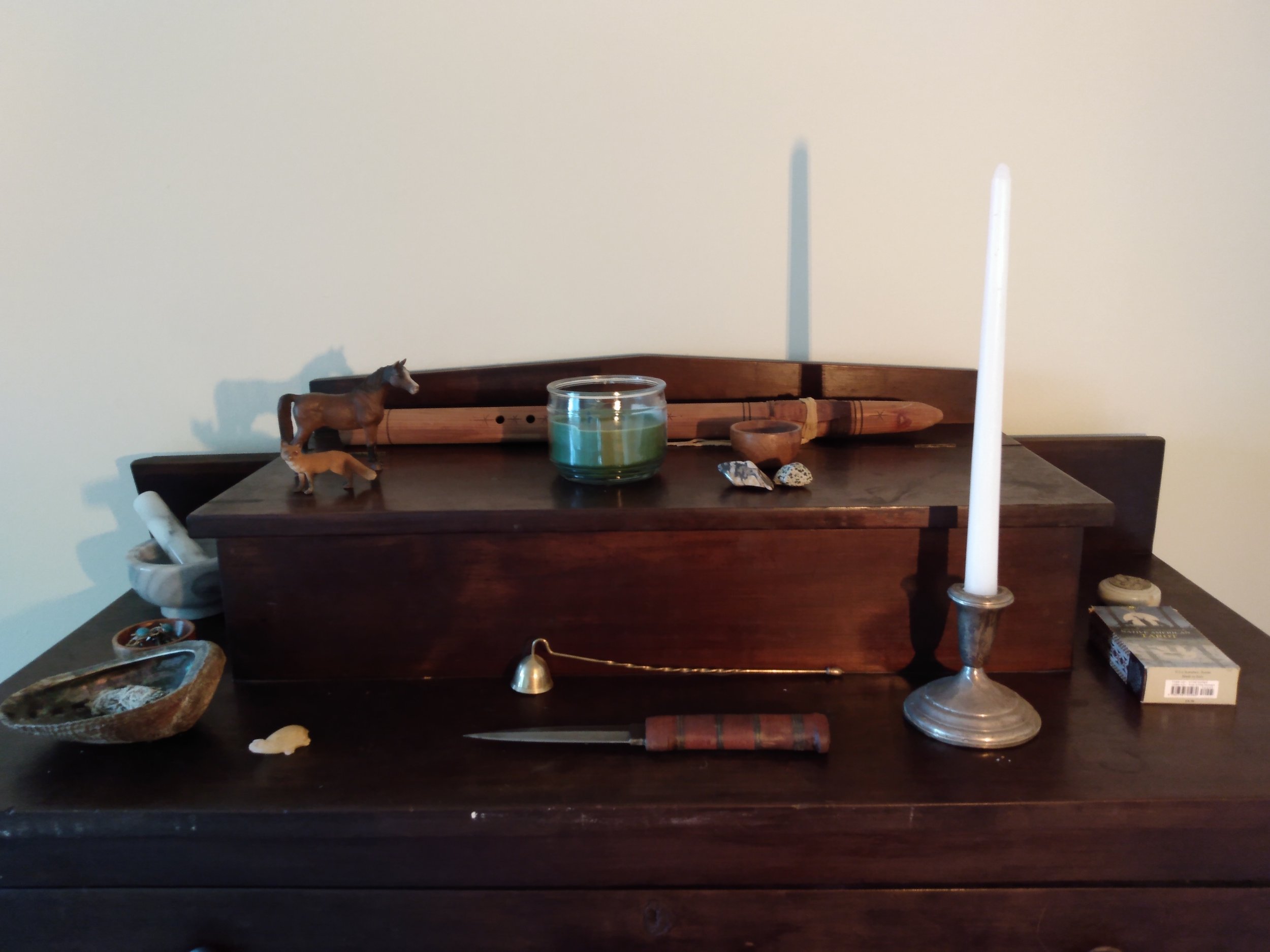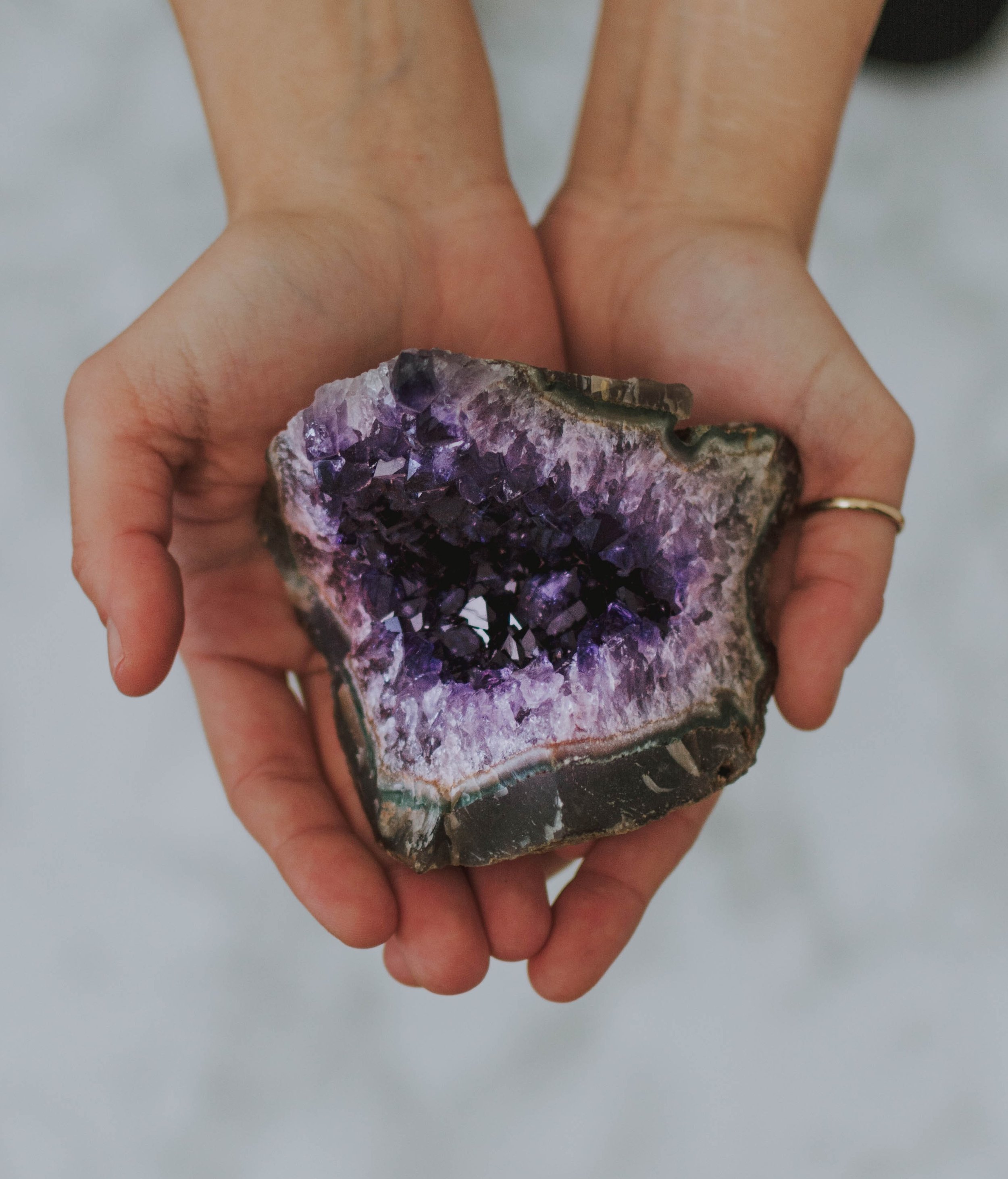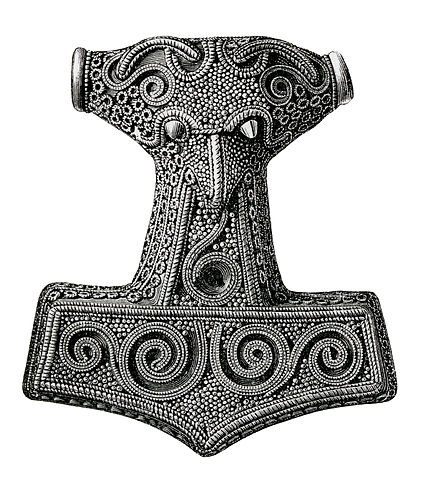Ritual Tools are physical objects used to focus and direct spiritual energy. They are both symbolic and practical.
Ritual tools are used in a variety of ways. They invoke deities, banish negative energy, help you perform rituals and magical spells, and direct energy through our touch and intention.
These tools are used by a variety of pagan faiths including Wicca, Nordic, Celtic, and Indigenous. What tools you use in your practice is up to you.
This guide will introduce you to 19 tools that you may choose to use and implement.
WHY DO PAGANS USE RITUAL TOOLS?
Pagans use ritual tools in their practices to enhance their rituals, invoke the deities they worship and connect with the more complex energies.
The general idea of the usage of ritual tools in pagan practices is also to better direct the psychic energies and/or to perform certain actions.
Ritual tools put us in touch with our ancestors. You may feel more connected as you model ancient practices.
That’s not to say you can not develop your own uses for your tools. That is one reason you will want to keep a Book of Spells - as a tool to write down your thoughts and ideas.
ALTAR
Your altar is the mainstay of your spiritual practice. You may have a central altar or multiple altars in several magical places. Altars can be indoors, outside, or portable.
Purpose
The purpose of your altar is to give you a place to focus, worship, and practice your faith. An altar does not remain the same. It changes based on what you are doing.
Uses
Your altar is your workspace, a place to put your ritual tools, sacrifices, dedications, statues of deities.
A central worship location
A place to pray and chant
Read our article Altars: Beginners Guide to help you get started.
2. ATHAME - RITUAL KNIFE
An athame is a knife you use in your rituals. It directs energy and is instrumental in Wiccan practices to Cast a Circle.
It is often dull, and double-edged, and not used for actual cutting. A boline knife is often used for cutting herbs or inscribing candles.
For Wicca practitioners, It can have a black or a white handle, depending on its purpose. The athame with a black handle is used to absorb the power, and the athame with a white handle is used in rituals to direct energy.
Shamans often prefer a handle made of bone or wood.
There are other ritual knives you may want to explore for your practice. The Kris is a wavy ritual knife used in Southeast Asia. The Phurba dagger is a ritual blade used to dispel evil in Indian and Nepalese cultures.
Purpose
The Athame isn’t used for cutting purposes, but it’s rather used during rites and spells. It is associated with fire and masculine energy.
Uses
Channel and direct energy
Casting a circle
Invoking the four directions
Drawing pentagrams
Mixing potions
Athame, ritual knife, for directing energy. Photo by Ame Vanorio
3. BAG
Druid Crane Bag/ Indigenous bag/Medicine pouch
PURPOSE
Many cultures have a bag that they use to carry sacred objects and/or ritual tools. The advantage being you carry your equipment with you and can perform rituals while hiking or away from home.
The Druids use a Crane Bag that has an interesting mythology. Manannán mac Lir is a major sea god and the guardian of the otherworld. Legend says he crafted the bag from the skin of a crane and placed his treasures in it. In addition to fabulous treasures, the crane bag also contained human language.
USES
A bag or pouch has unlimited uses.
I use a small leather bag to carry crystals with me. I can place the bag in my purse, pocket or attach it to my jeans. The crystals then are close to my body and provide energy.
A larger bag can hold items to take with you into a natural area
A small bag carried on your person can hold items that are sacred to you
4. BELLS AND RATTLES
The bell is a ritual instrument of incredible antiquity. Ringing the bell unleashes vibrations that have a powerful effect according to its tone, volume, and material it’s made from.
Variations of the bell which also add an auditory element are the singing bowl or Shamans Rattle.
Purpose
Ringing the bell or shaking a rattle can invoke deities, ward off evil spirits and spells, and evoke good energies.
Uses
During rituals, you can ring bells to attract good spirits or dispel evil ones, during your invocations.
Bells can also be placed in cupboards or hung on the doors, as it serves the purpose of protecting the home.
Bells and Rattles make a great way to begin and end a ritual.
5. BESOM
The besom is a broom that is used to sweep out a ceremonial space.
Making your own besom can be a meaningful experience. In our article Celtic Month of Ash, we go through the steps of making a besom.
You can also purchase a natural broom on Amazon.
Purpose
It is used when symbolically sweeping away bad energy and cleansing a space. A besom is connected to the element of water and is thus considered a purifier.
Uses
The besom is also used in pagan wedding ceremonies.
Place a besom under your bed to prevent nightmares.
6. BOOK OF SHADOWS
Your Book of Shadows or BOS for short is simply a notebook or journal. This tradition was started by Wiccan Gerald Gardner but is useful in every practice.
Purpose of the Book of Shadows
There is no “One” Book of Shadows. The point is that you are on your own spiritual journey and this gives you a place to record your progress.
Uses of the book of shadows
Write down spells and rituals
Write down prayers or chants
Take notes on how the spell went and what you might improve upon.
I like to sketch in my BOS because the act of drawing helps me to process thoughts.
7. CANDLES
Candles of various colors are important in pagan rituals and spells. The color of the candle has a unique meaning.
Confused about the difference between a ritual and a spell? Click on this article to explain more.
Purpose
Candles have two main purposes. First, they represent the element of fire. Secondly, they are often used in spell work.
Uses
Symbolize light and fire on your altar
Candle magic
Intentions
8. CAULDRON
The cauldron is a vessel that represents feminity and is used for burning objects such as incense. It represents the element of water when used on the altar.
You can purchase cauldrons in a variety of sizes.
Purpose
A small cauldron can be set on your altar while a larger one may be used outside for spell work. You can cook in them as well however I would suggest having one for magic and one for cooking.
The Celtic goddess Cerridwen is the Keeper of the Cauldron of knowledge and inspiration. She also has the gift of prophecy.
Uses
Burn incense, small tea candles, or offerings in it
Use it in spell work
Place herb mixtures in it
Use it for moonlight scrying
9. CHALICE
A chalice, also known as a goblet, is a cup intended to hold liquid during rituals. The chalice is feminine and womblike. It represents the element of Water and can hold anything from water to wine.
Purpose
In religious practice, a chalice is used for drinking during certain ceremonies, or it carries a symbolic meaning. In Wiccan culture, it is a great symbol of the Goddess and it represents her womb.
During rituals, it’s used to store drinks or some other liquid you use in it, and sometimes to drink from it. In group rituals, for safe health, each person should have their own goblet.
On some occasions, a chalice serves just as a symbol during rituals.
Uses
You can use the chalice to hold a drink or a liquid and then imbibe it during the rites you perform.
Use it to hold water to purify yourself, plants, or some other magical purposes.
10. CRYSTALS AND GEMSTONES
Crystals and Gems come in a variety of shapes, sizes, and colors. Did you know table salt is a crystal?
Crystals contain energy and powers of their own and different types have different attributes.
New to crystals? Read my article 10 Most Essential Crystal for Pagans
Purpose
Crystals and Gemstones have specific attributes and correspondences. This makes them perfect for spells and rituals. They are also used for energy work, healing, and purification.
Uses
I typically pick out a crystal in the morning that reflects my mood or my goal for the day. I place the crystal in a pouch or pocket and carry it with me.
Caring for your crystals is important!
11. Divination Tools
There are many types of divination tools. The most popular are Ogham staves, Norse runes, Numerology, and Tarot or Oracle cards.
Different practices may place emphasis on one or the other. However, feel free to explore different methods.
TIP: They all take lots of practice to be skilled in the interpretations! I (Ame) have been using my tarot deck for myself for many years but still lack the confidence to read for others. And that’s ok. Practice and go forward when you are ready.
Purpose of Divination Tools
Divination tools help us to seek knowledge about the past, present, and/or future.
Divination tools are very personal and you should choose ones that speak to you. I have this Native American Tarot deck which I love, contains my energy and I feel I get a good reading because I have been using it for many years. I also love that it is multi-lingual which I am as well and so gives me a multi-cultural connection.
Uses of Divination Tools
Communicate with ourselves and our spirit guides
Reach a higher astral plane
Connect with our ancestors
Help to direct energy
Focus, answer questions and provide clarity
12. Hammer
Hammer or Hamarr is a Norse ritual tool stemming from Thor. Thor’s hammer is called Mjölnir and was used as a weapon as well as a divine instrument to provide blessings.
Purpose
The hammer makes a space holy and prevents entry by all evil things. It offers protection and brings fertility.
Many Norse-oriented Wiccans have a Hammer Rite to cleanse a space. This is a calling to designate to ourselves, and to the Gods, that we’re about to perform a ritual.
Uses
Lore states that at Norse weddings, Thor’s hammer was placed in the bride’s lap to assure fertility.
Traditionally the hammer was worn as a pendant or amulet.
13. Hlautbolli
The hlautbolli is a ceremonial bowl used to hold consecrated liquid.
Purpose of Hlautbolli
Holds liquids used for sprinkling during the ritual.
Uses
In Norse lore, the blood of a sacrifice would be caught in the Hlautbolli.
Carries the energy of the sacrifice to the Nine Realms.
Holds liquids use to bless other objects.
14. Horn
Horns are used in many cultures although we often associate them with Vikings.
Purpose
Horns have two purposes. First is a drinking horn that is used to hold liquid for dedicating to a God or Goddess.
Drinking horns are clean hollow cattle or sheep horns often with some sort of lining.
The second is the blowing horn which is used to call members to a gathering, start a ritual, or make an announcement.
Uses
Face each cardinal direction and blow the horn. This job is often given to an older child and I can remember being so excited when it was my turn!
Drinking a blessed liquid during a ceremony or ritual.
Norse style drinking horn
15. The Pentacle
The pentacle is a talisman that is often used to invoke a deity or spirit. Often worn around the neck giving the wearer protection and authority.
The points represent North, South, East, West, and the Spirit.
There are subtle differences between a pentacle and a pentagram.
The pentagram is a five-pointed star that is a continuous line of equal sides. Many ancient religions including Judaism, Ancient Chinese, and Celts felt strong connections to this symbol.
The pentacle is a pentagram enclosed in a circle. The circle unifies all the elements.
What Is Its Purpose of the Pentacle?
The Pentacle is the symbol of the earth element, and its purpose is to represent it in practice. They can be used in ceremonial magic, rituals for summoning the deities, like God and Goddess, or in rituals to draw money.
How Do We Use the Pentacle?
For protection, or to invoke spirits.
Place upon amulets, charms, or other objects to be ritually consecrated.
Pentacles are also hung over doors and windows in the house to act as protective devices.
When carved from wood, the pentacle is linked to nature and the earthly world.
Made from gold it will enhance mental clarity and invoke wisdom.
Made from silver the talisman will link you to the Moon and increase your clairvoyant and psychic abilities.
16. Robe or Cloak
Many persons like to wear ceremonial or special clothing when participating in a ritual. Some groups assign certain colors or styles to different levels within the group.
For instance, Native Americans wear different style headdresses in accordance with their status.
If you are crafty sewing a cloak or robe is not difficult. Many small businesses make and sell them. Amazon has a variety of cloaks available.
Purpose
The purpose of a robe or cloak may be to identify your job in a group. Or it may be simple to put you in the right frame of mind to perform a ritual or spell. You may wish to have different colors to go with the seasons or holidays.
Uses
To help you feel in the moment and prepare psychologically
Identifies person as a leader
Tradition
Easy to wear as an outer garment if you are a skyclad practitioner
17. Stav
A stav is a magic or ritual staff that is typically symbolic of authority. Staffs are used in many cultures. Norse term is Völva.
Purpose
The stav represents air and symbolizes masculine energy. A staff does not need to be fancy. Go out into the woods and search for a downed limb that you can smooth out to be a staff. Don’t forget to thank the tree!
Uses
Identify a leader or person of authority
Keeps rhythm in a song
To simply help you walk if you are traversing out in nature
18. Twig or branch
In Celtic or Norse cultures this is referred to as a Teinn.
Purpose
A twig or branch is used to sprinkle water on the altar, tools, or participants. Often the branch came from a symbolic or sacred tree. Thanks were given to the plant and a gift bestowed.
Uses
At a Viking wedding, fir branches were dipped in consecrated water and then sprinkled on the bride and groom.
Y shaped branches can be used for divination
Hazel and ash twigs are used for protection.
Beech is good for luck and success
Make an amulet from ash or rowan twigs.
Read our Article Celtic Tree Month of Rowan
19. Wand
It has been used for thousands of years in magical and religious rites. Wands are made traditionally from wood. It is not uncommon to receive a gift of a branch from a tree and make your own wand. Your ideal wand will find you.
What Is the Purpose of the Wand?
The wand is the symbol of the air element, and an instrument of invocation and directing the energy, drawing magical symbols on the ground and in the air, and also casting a circle. The wand can also be used in power-raising rituals and while inviting beings and deities to attend the circle.
How Do We Use Wands?
Cast a sacred circle
Write symbols in the air or on the ground
Direct the energies
Invite deities and beings you want to be present
TAKE AWAY
Remember the choice is yours. Adopt what ritual tools speak to you and use them.
However, remember the most important thing is to make time in your daily schedule for your practice. Give thanks, honor the Gods, Goddesses, and Earth Mother
Authors: This was a collaboration between Katherine, Ame, and Marko. Each of us brought some of our personal experiences to the article.
0 Likes Share








Pine forests are some of the oldest on earth. And with that age comes great wisdom and energy. They are found throughout North America, northern Europe and Asia. The entire pine tree is magical including the evergreen branches, the resin, and the cones.